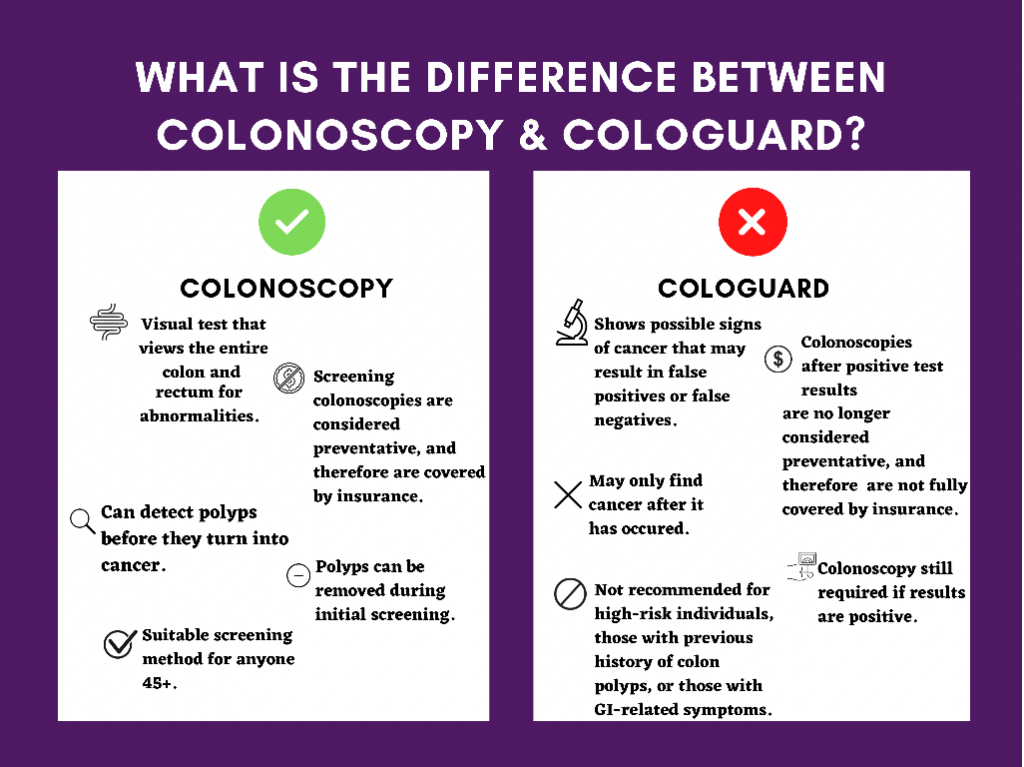What is Colonoscopy?
Colonoscopy is a procedure that uses a long, flexible, narrow tube with a light and tiny camera on one end, called a colonoscope or scope, to look inside the rectum and entire colon. Colonoscopy can show irritated and swollen tissue, ulcers, and polyps—extra pieces of tissue that grow on the lining of the intestine.
A colonoscopy is performed to help diagnose:
- changes in bowel habits
- abdominal pain
- bleeding from the anus
- weight loss
The colonoscopy process consists of three basic parts:
- The day before the exam the patient must follow a clear liquid diet; otherwise the day’s activities are unrestricted.
- That evening the patient takes medication that will induce diarrhea to cleanse the colon for the next day’s exam.
- The next morning the patient is brought to the designated facility, where an IV is started. The patient is sedated in a monitored setting for the procedure.
The actual colonoscopy procedure involves passing a thin, flexible tube with a camera on the tip through the large intestine, or colon. The colonoscope inspects and potentially removes or biopsies polyps or abnormal growths.
Following the exam and a short recovery period, the patient is discharged from the facility and taken home by their designated escort. The patient is instructed to relax the rest of the day. Typically, there are no other restrictions.

prep instructions
consent forms
Our physicians also perform colonoscopies as a screening test for colon cancer
FREQUENTLY ASKED QUESTIONS REGARDING COLONOSCOPY PREPARATION
What are examples of clear liquids that I can take the day before my colonoscopy?
In general, if light can shine through a liquid, it is considered a clear liquid. Such examples include water, apple juice, soda, and coffee without creamer. You may also have Jell-o (not red), soup broth (without noodles or vegetable), and popsicles (not red). Click HERE for a sample diet.
Can I drink alcohol the day before my procedure?
We do NOT recommend that you drink alcohol the day before your procedure, since we routinely give sedatives before and during the procedure. The sedatives can interact with alcohol.
Why am I instructed to take the second part of the preparation six hours before my procedure? Do I need to wake up in the middle of the night to do this?
Recent studies have shown that completing the preparation six hours prior to the procedure improves detection rates of colon polyps. Many physicians recommend that the preparation be taken in this manner. Depending on your appointment time, this may require you to wake up in the middle of the night to complete the preparation.
Do I need a driver? Does my driver need to stay with me throughout the procedure?
Most procedures involve sedation, and if yours does, you will need someone to drive you home. The driver must be present throughout the appointment.
I have vomited part of my preparation. What should I do?
Unfortunately, it is not unusual to become nauseated after taking the colonoscopy preparation. If your stool output is a light-yellow liquid or clear, without solid debris, the preparation that you have completed is probably adequate. If you have been unable to drink enough of the liquid due to nausea or vomiting, please call our office for further instructions.
Can I start my preparation earlier than the stated time?
We recommend that you follow the written instructions, including the starting time. This is to help ensure that your preparation is effective in aiding our ability to detect colon abnormalities such as polyps.
WHAT IS COLON CANCER SCREENING?
Colon cancer is the second-leading cause of cancer deaths in the United States, but the numbers are beginning to fall as more people learn about the necessity of screening for the early diagnosis of common colon cancers. Screening tests, ordered before symptoms develop, can be critical to diagnosis and treatment. These tests help find cancer early, making a cure more likely.
Screening recommendations, as determined by a physician, depend on an individual’s risk for colorectal cancer. The American Cancer Society recommends a colonoscopy for colon cancer screening beginning at age 45. If no abnormalities are found, the procedure should be performed every 10 years thereafter, until age 75. People with a higher risk of developing colorectal cancer (such as those with specific gastrointestinal symptoms, certain genetic disorders, a personal history of polyps, or close family history of polyps or colorectal cancer) should begin screening at a younger age, more frequently.
DID YOU KNOW?
- Colon cancer affects individuals equally, regardless of gender.
- African Americans have a slightly higher risk of colon cancer.
- Nearly 75 percent of colon cancer cases have no prior family history.
- In its early stages, colon cancer generally has no symptoms and gives no warnings.
- The American Cancer Society recommends a colonoscopy as a screening test beginning at age 45.
- Polyps are benign growths that have the potential to develop into cancerous tissue if left unchecked. They can be removed easily during a colonoscopy, eliminating the possibility that they could become cancerous.
- A colonoscopy is neither painful nor unpleasant. Patients are sedated to eliminate or minimize any discomfort, and the procedure lasts 30 to 60 minutes.
- Most colon cancer screenings can be done at our outpatient center, rather than in a hospital.
- When colon cancer is caught early, it has a more than 90 percent survival rate, which is why screening is so important.